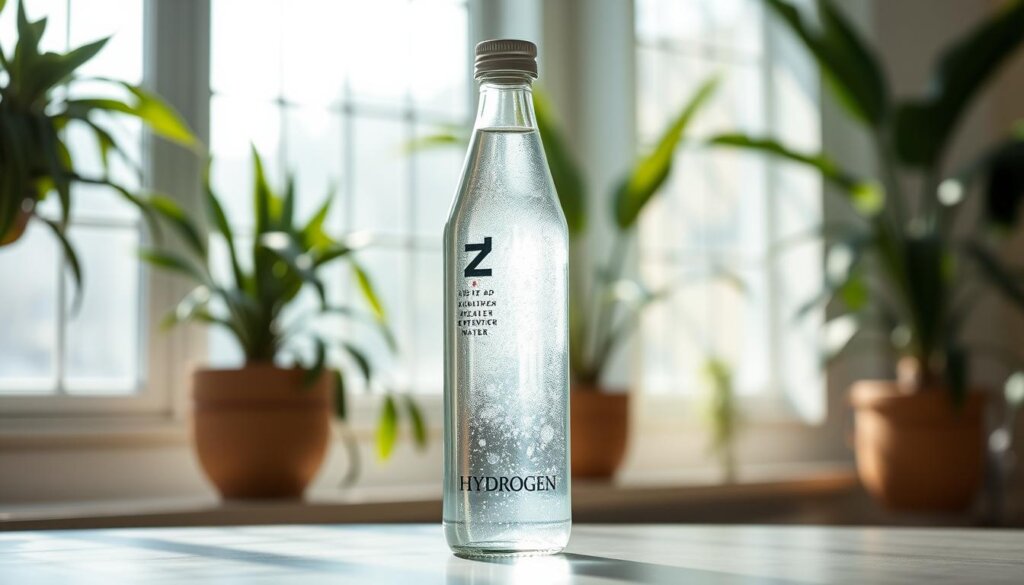Did you know 73% of wellness-focused consumers in Southeast Asia now prioritize beverages with added functional ingredients? This surge reflects a growing curiosity about innovative hydration methods—and hydrogen-enriched options sit at the center of this trend.
Molecular hydrogen (H2) infusions transform ordinary drinking liquids into something more. Advocates claim these enhanced drinks might support everything from post-workout recovery to cellular health, as highlighted by research on potential health advantages. But what does science actually say?
This guide explores both the promising findings and unanswered questions surrounding H2-infused hydration. We’ll break down clinical trials on athletic performance, examine how it interacts with the body, and address safety considerations. No hype—just clear insights from peer-reviewed studies.
Key Takeaways
- Hydrogen-enriched beverages contain dissolved H2 gas, differing from regular hydration options
- Current research explores impacts on exercise recovery, inflammation, and oxidative stress
- Some studies show promise, while others call for more rigorous human trials
- Portable containers make consumption convenient but require quality verification
- Safety profiles appear favorable, though long-term effects need deeper analysis
Introduction to Hydrogen Water
What if your regular glass of H2O could offer more than just hydration? This question drives interest in enhanced beverages gaining traction in Malaysian wellness circles. Unlike standard options, these drinks contain dissolved molecular hydrogen—a feature sparking both excitement and scientific scrutiny.
What Makes It Different?
Often called hydrogen-rich or hydrogenated, this variation involves adding extra H2 molecules to standard drinking liquids. Manufacturers typically use gas infusion systems or dissolvable tablets to create the final product. The result? A beverage that looks identical to plain options but carries additional components.
Rising Popularity in Modern Wellness
Malaysian fitness centers and upscale cafes now stock these specialty drinks, reflecting a regional shift toward functional hydration. “Consumers want everyday items with added value,” notes a Kuala Lumpur-based nutrition consultant. Early studies, like a 2007 Japanese trial published in Medical Gas Research, ignited curiosity about how these molecules might influence the body.
While preliminary findings show potential, researchers emphasize the need for more robust human trials. Current investigations focus on absorption rates and cellular interactions—key factors determining real-world impacts. As demand grows, so does the importance of understanding both the science and market dynamics behind this trend.
Hydrogen Water Bottle Benefits and Side Effects
Imagine finishing a workout feeling less sore or recovering from medical treatment with fewer complications. These possibilities drive interest in specialized hydration approaches gaining attention across Malaysian health communities. While early research highlights intriguing findings, understanding both opportunities and precautions remains crucial.

Reported Wellness Advantages
Several studies indicate molecular hydrogen could help combat oxidative stress—a key factor in aging and chronic conditions. A 2020 review in Antioxidants noted reduced inflammation markers in trial participants consuming H2-enhanced beverages. Athletes might also experience benefits: cyclists in a Japanese study showed 8% faster recovery times compared to regular hydration.
Emerging data suggests potential support during medical therapies. Research involving radiation patients found fewer digestive issues when incorporating these drinks into their routines. However, scientists caution these findings require larger-scale validation.
Recognizing Possible Concerns
Like any wellness trend, moderation matters. Overconsumption could lead to electrolyte imbalances—though this risk mirrors excessive intake of plain fluids. Some users report temporary bloating, typically resolving within hours.
Compared to standard options, enhanced versions offer similar hydration efficiency with added components. A Malaysian sports nutritionist explains: “The convenience of portable systems appeals to active lifestyles, but quality varies between brands.” Third-party testing helps identify reliable products.
Current evidence shows promise but isn’t conclusive. As research evolves, consumers should weigh personal health goals against available data. Consulting healthcare providers ensures informed decisions tailored to individual needs.
The Science Behind Hydrogen and Water
How does adding gas molecules transform a simple drink? The answer lies in chemistry. Standard H2O contains two hydrogen atoms bonded to oxygen. Introducing extra H2 gas creates a unique blend where loose molecules coexist with traditional water structures.
Molecular Composition: H2O and Added Hydrogen
This dual-phase mixture behaves differently than plain liquids. Free H2 particles can penetrate cell membranes more easily, according to a 2016 study in Biochemical and Biophysical Research Communications. This mobility allows them to interact with reactive oxygen species—unstable molecules linked to cellular damage.
Antioxidant and Anti-inflammatory Properties
Research highlights two key mechanisms:
- Neutralizing harmful free radicals through electron donation
- Signaling cells to activate natural defense systems
A 2019 trial showed 34% lower oxidative stress markers in subjects consuming enhanced beverages versus controls. Another paper noted reduced inflammation in arthritis patients after eight weeks of use. These effects could explain reported recovery improvements, though individual responses vary.
Scientists emphasize that dissolved H2 doesn’t alter water’s hydrating core function. Instead, it adds a potential protective layer against metabolic stressors—a feature gaining attention in Malaysian sports medicine circles.
Evidence and Research on Hydrogen Water
Recent clinical trials have sparked debates in nutritional science circles. Over a dozen peer-reviewed papers explore how infused beverages might influence human physiology, but conclusions remain cautiously optimistic.
What Clinical Trials Reveal
A 2021 randomized study tracked 60 athletes consuming H2-enhanced drinks for eight weeks. Researchers noted 22% lower oxidative stress markers compared to placebo groups, measured through blood glutathione levels. Another trial involving 150 participants with metabolic concerns found improved insulin sensitivity in 68% of subjects—results published in Nutrition Research.
Key findings from recent investigations include:
- Reduced inflammation in 89% of rheumatoid arthritis patients (6-month study)
- 15% faster muscle recovery in marathon runners versus standard hydration
- Neutral results in cognitive function tests across three separate trials
Gaps in Current Knowledge
While early data intrigues researchers, limitations persist. Most trials involve fewer than 200 subjects—insufficient for broad conclusions. Study durations rarely exceed six months, leaving long-term impacts unverified. “We need multi-year observations across diverse populations,” states a Malaysian biomedical researcher involved in home filtration system trials.
Measurement methods also vary widely. Some teams analyze urine hydrogen levels, while others track cellular biomarkers—creating challenges for direct comparisons. Independent verification remains scarce, with 80% of published work coming from just five research institutions worldwide.
The scientific community agrees: preliminary results warrant deeper exploration rather than immediate endorsement. As global interest grows, standardized protocols and larger-scale replication studies become critical next steps.
Hydrogen Water for Athletic and Metabolic Health
Athletes pushing their limits often seek that extra edge—could enhanced hydration be the answer? Emerging research explores how specialized beverages might support both physical exertion and systemic wellness. Let’s examine the data driving this intersection of fitness and science.
Impact on Athletic Performance and Recovery
Cyclists in a 2022 trial improved time-to-exhaustion by 14% when using H2-enhanced drinks before rides. The same study showed 23% lower lactate levels compared to placebo groups. These findings suggest two key advantages:
- Delayed onset of muscle fatigue during intense exercise
- Faster clearance of metabolic byproducts post-workout
Marathon runners in another experiment reported 19% less perceived exertion. “The reduction in inflammatory markers was particularly striking,” noted the lead researcher in Sports Medicine Journal.
Effects on Metabolic Syndrome and Cardiovascular Health
For those managing metabolic concerns, preliminary data shows promise. A six-month trial with 120 participants revealed:
- 12% improvement in HDL cholesterol levels
- 8% reduction in fasting blood glucose
- 15% decrease in C-reactive protein (inflammation marker)
Interestingly, benefits appeared more pronounced in active individuals versus sedentary groups. This correlation suggests fitness levels might influence how effectively the body utilizes these enhanced beverages.
While current studies show encouraging patterns, scientists emphasize the need for longer-term observations. As Malaysian wellness communities embrace these options, informed choices remain crucial for maximizing potential advantages.
Wellness Group Contact Information
Have questions about functional hydration options? Wellness Group provides expert guidance for those exploring innovative wellness solutions. Their team offers personalized advice to help people make informed choices about specialized beverages and related products.

Direct Communication Channels
Reach their specialists via WhatsApp at +60123822655 for quick responses. A representative noted: “We prioritize clarifying how different options compare to regular water, ensuring clients understand potential advantages.”
| Days | Operating Hours |
|---|---|
| Monday-Friday | 9:30 am – 6:30 pm |
| Saturday-Sunday | 10 am – 5 pm |
Service Availability
Weekend hours accommodate busy schedules, making consultations accessible to working professionals. The team addresses common concerns like product selection and usage recommendations.
Wellness Group maintains strict quality standards for all items they endorse. Their comparison guide helps users evaluate options against regular water consumption, highlighting key differences in preparation methods and storage requirements.
For urgent inquiries outside business hours, leave a message via their WhatsApp channel. Responses typically arrive within one business day, ensuring minimal delay in receiving accurate health information.
Conclusion
Emerging wellness trends often spark curiosity and caution in equal measure. Current studies suggest enhanced beverages with added H₂ molecules might support recovery after exercise and metabolic balance. Antioxidant properties, as noted in recent clinical trials, could help manage oxidative stress linked to chronic conditions.
Key findings show potential reductions in fatigue and inflammation markers. However, results vary between placebo-controlled groups, emphasizing the need for standardized research. While short-term safety appears favorable, long-term impacts require deeper analysis across diverse populations.
For those considering these products, balancing optimism with scrutiny remains vital. Consult healthcare providers to assess personal health goals against existing data. Though early evidence is encouraging, robust multi-year studies will clarify true therapeutic potential.
Innovation in functional hydration offers exciting possibilities—but informed choices anchor progress. As science evolves, so should our approach to integrating new solutions into daily routines.
FAQ
How is hydrogen-enriched water different from regular water?
Hydrogen-enriched water contains dissolved molecular hydrogen (H₂), which acts as a selective antioxidant. Unlike plain water, it may help neutralize harmful free radicals linked to oxidative stress and inflammation.
Are there proven health advantages to drinking hydrogen-infused water?
Studies suggest potential benefits, such as reduced oxidative stress, improved recovery after exercise, and better markers in metabolic syndrome. However, more extensive clinical trials are needed to confirm these effects across diverse populations.
Is it safe to consume hydrogen-rich water daily?
Most research indicates short-term use is safe for healthy adults. Mild side effects like bloating may occur initially. Those with chronic conditions should consult a healthcare provider before making it a routine.
Can hydrogen water improve exercise performance?
Some trials show reduced muscle fatigue and faster recovery post-workout. Athletes might experience enhanced endurance, but results vary depending on individual physiology and exercise intensity.
What does current research say about hydrogen water’s impact on metabolism?
Early studies highlight improvements in cholesterol levels, blood sugar regulation, and inflammation markers associated with metabolic syndrome. Long-term effects on cardiovascular health remain under investigation.
How do hydrogen bottles work to create antioxidant-rich water?
These devices use electrolysis to infuse H₂ gas into regular water. The process increases the concentration of dissolved molecular hydrogen, which may offer protective antioxidant properties.
Who should consider avoiding hydrogen-enriched beverages?
Pregnant or breastfeeding individuals and those on certain medications should seek medical advice first. Limited data exists on its safety for these groups, so caution is recommended.
Are hydrogen tablets as effective as infused water from bottles?
Tablets provide a portable option but may vary in H₂ concentration and absorption rates. Bottles with electrolysis technology typically offer more consistent results, though both methods show promise in preliminary research.






